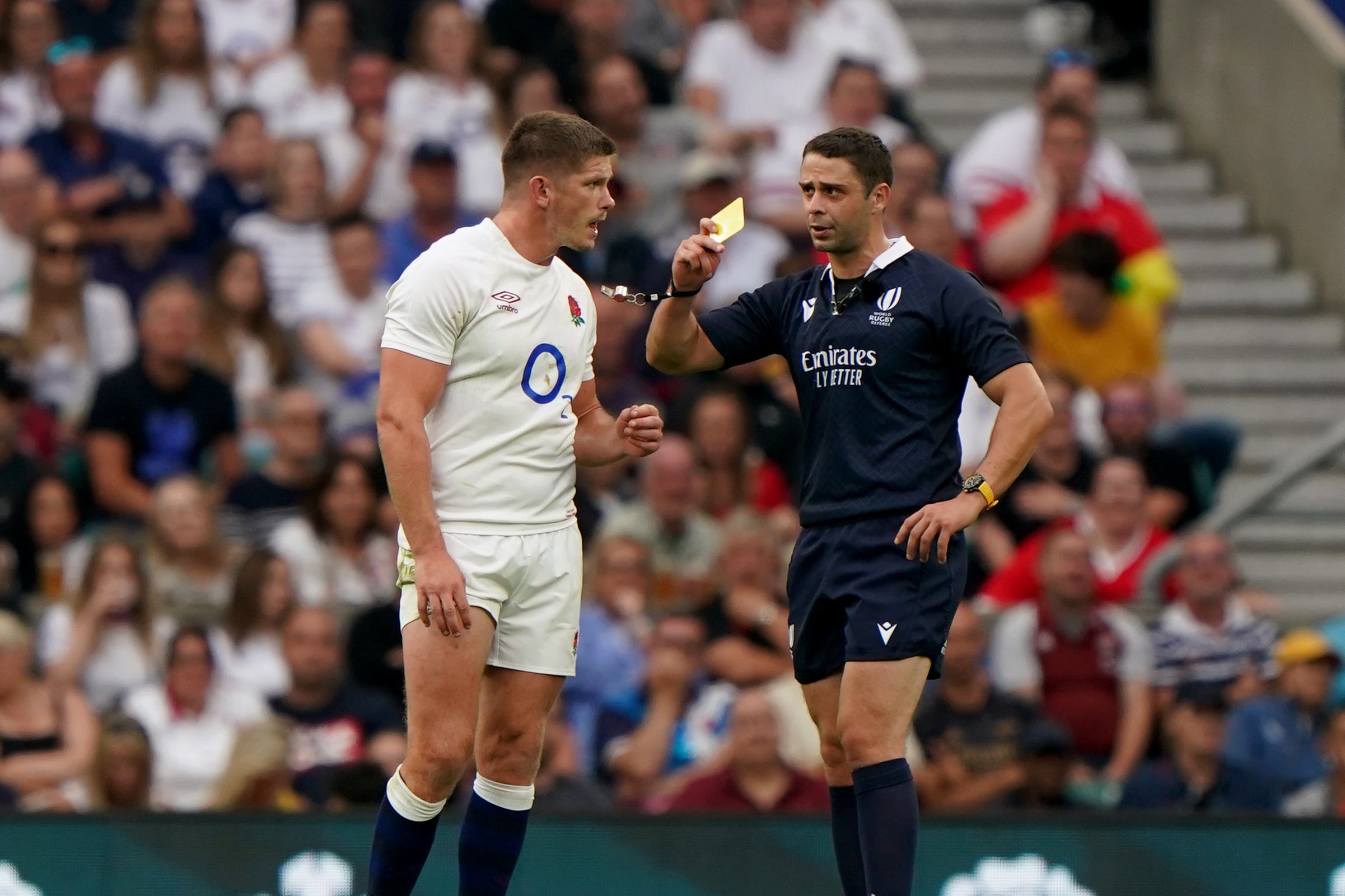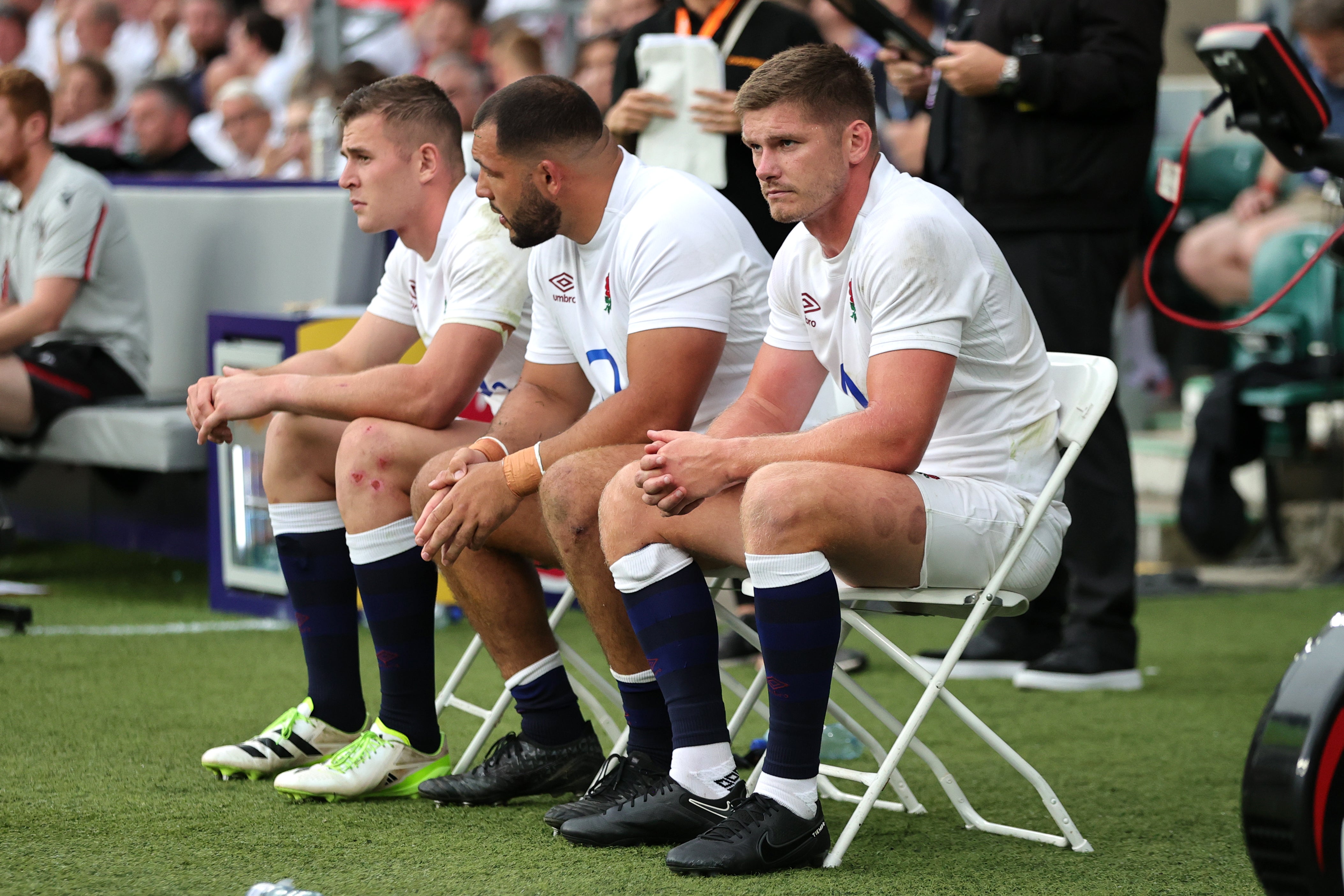Owen Farrell’s failure to adapt leaves England with complicated questions
Farrell’s red card against Wales and invetiable pending ban has left England with a serious dilemma just weeks before the Rugby World Cup

Your support helps us to tell the story
From reproductive rights to climate change to Big Tech, The Independent is on the ground when the story is developing. Whether it's investigating the financials of Elon Musk's pro-Trump PAC or producing our latest documentary, 'The A Word', which shines a light on the American women fighting for reproductive rights, we know how important it is to parse out the facts from the messaging.
At such a critical moment in US history, we need reporters on the ground. Your donation allows us to keep sending journalists to speak to both sides of the story.
The Independent is trusted by Americans across the entire political spectrum. And unlike many other quality news outlets, we choose not to lock Americans out of our reporting and analysis with paywalls. We believe quality journalism should be available to everyone, paid for by those who can afford it.
Your support makes all the difference."I think right across the sport we know we need to change,” Kevin Sinfield, England’s defence coach, stressed. It was January, and Owen Farrell had just been given a three-match suspension after making contact with the chin of Gloucester’s Jack Clement while playing for Saracens. “Owen fully accepts he needs to change and is willing to work extremely hard at it.”
And yet here we are again, with Farrell back in the disciplinary dock. As referee Nika Amashukeli looked up to the big screen on Saturday evening, the identity of the offending player caught few inside Twickenham by surprise. It was a clumsy, ugly collision, a shoulder directly into Taine Basham’s head with significant force. The decision to send off Farrell, after the officials progressed through the review process, was straightforward.
Now, the questions are more complicated. Farrell will appear before a hearing on Tuesday for the second time this year. A ban is a certainty. Steve Borthwick refused to engage in hypotheticals on Saturday evening but the England head coach, it can be said with almost total conviction, will begin his World Cup campaign without his captain.
Buried deep in the written judgment of Farrell’s most recent trip in front of a disciplinary panel was a line that stated that the fly half “is not a repeat offender whose status warrants an increase in sanction”, citing the relatively infrequent recurrence interval, with a 2016 ban entirely disregarded and a 2020 sanction considered relatively distant, too.
That argument no longer holds with the three-match suspension he served after the Clement collision so recent. A bit of fixture gerrymandering by England allowed their captain to dodge the sword of Damocles and feature against Scotland then; Farrell is unlikely to be so fortunate this time.
Taking a six-match entry point, as is mandatory due to the head contact, the ramifications are clear. World Rugby has confirmed that there are no “tackle school” resits to earn Farrell a further reduction. A guilty plea and apology would typically knock a week off. The possibility that Farrell is now considered a habitual wrongdoer could add that back on.
An argument can be made that England’s (slim) World Cup chances rest not on Tuesday’s verdict. However compelling Farrell’s club form has been, England’s fly half stocks are reasonably strong. Stand-in skipper Courtney Lawes and replacement No 10 George Ford, the likely beneficiaries of any ban, showed their calm qualities in those final 15 minutes. But the potential loss of their captain for an extended period will unsettle a group needing to bond and build together.

A five-match ban would keep Farrell out of England’s games against Argentina, Japan and Chile. A six-match ban would rule him out of the group stages entirely. England are strong favourites to progress from Pool D, but a quarter-final berth is no certainty. It is a worthwhile question to wonder if Borthwick can afford to take a player to a tournament at which there is no guarantee he will be able to play.
In 2015, Stuart Lancaster elected to omit Dylan Hartley from his squad, with a four-match ban for headbutting Jamie George encompassing England’s World Cup opener against Fiji. The circumstances, of course, are different – Hartley was not yet captain (that honour came the following year under Eddie Jones), and the hooker was serving a fifth suspension in three years.
But Lancaster’s words seem germane now. “The risks ahead of the first match were too great,” Lancaster explained of his decision at the time. “You could have a case where the physio comes up the day before the game and says one of the hookers has a tight hamstring and I am sat there as the coach of the home nation playing the biggest game we have had and we have one hooker and no one on the bench. People would look at me as if I were daft.”
Now swap each mention of hooker for fly half and consider the current situation. Borthwick explained at length both before and at his squad announcement that it was a necessity to have three options at specialist positions within his squad, recognising that a gameday injury or 12-day lay-off after a concussion could leave him short if he went with only two. Does the potential removal of Farrell for some of England’s French business unbalance that particular equation? “Once I have all the facts, I’ll deal with the situation,” Borthwick promised on Saturday. For now, England wait.

You feel for Farrell, in some ways. Elite rugby’s kinetics are complex and the margins are fine. Players are demanded to operate with absolute precision at the very highest of intensities, while coaches urge that they impose themselves and win collisions. But more of the sympathy must be extended to Basham. The flanker had been excellent having been called on from the bench to try and earn a World Cup place, but did not return from his head injury assessment.
It is imperative that rugby does all it can to reduce incidents of head contact. It cannot, then, be a good look that one of the sport’s most recognisable and prominent individuals has a reputation – rightly or wrongly – for shouldering players in the head. Be it a problem of technique or temperament, something needs to change. It has been emphasised repeatedly to England’s players that they will have to adapt over these coming weeks; Borthwick’s biggest problem might be Farrell’s failure to do so.



Join our commenting forum
Join thought-provoking conversations, follow other Independent readers and see their replies
Comments